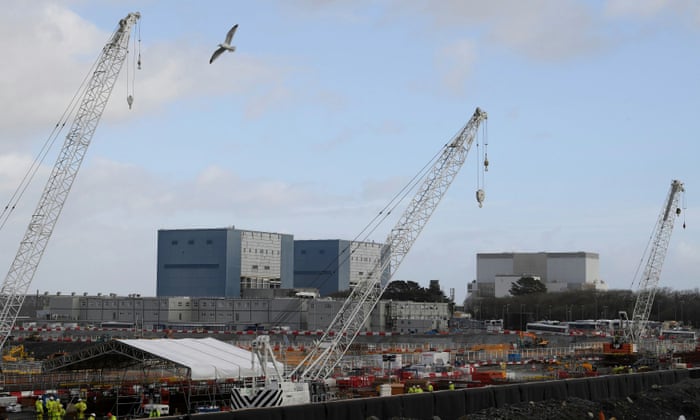UK factory output and orders shrink
UK factories also had a troubling start to the summer, matching the gloomy picture across Europe and in Asia.
British manufacturers suffered their first drop in output in over two years in July, as new orders and fresh export business both continued to decline.
Companies were hit by weaker market demand, difficulties in sourcing components and transportation delays, as well as a drop in new business.
This pulled the manufacturing PMI to a 25-month low, as activity growth slowed.
Firms blamed a drop in new orders on the cost of living crisis, weak domestic demand, client uncertainty, warmer-than-usual weather and lower intakes of new export business.
Foreign demand fell for the sixth month in a row, amid reports of weaker inflows from mainland Europe (partly due to post-Brexit issues), the USA and China.
Rob Dobson, director at S&P Global Market Intelligence, said:
“The UK manufacturing sector shifted into reverse gear at the start of the third quarter. Output contracted for the first time since May 2020, as new order intakes suffered the first back-to-back monthly decreases for two years. Rising market uncertainty, the cost of living crisis, war in Ukraine, ongoing supply issues and inflationary pressures are all hitting demand for goods at the same time, while lingering post-Brexit issues and the darkening global economic backdrop are hampering exports.
“With the Bank of England implementing further interest rate hikes to combat inflation, the outlook is beset with downside risks. With this in mind, the continued low degree of optimism among manufacturers is of little surprise.
There was one bright note – job creation accelerated as companies addressed staff shortages.
Key events
Filters BETA
A second survey of US factories, from the Institute of Supply Management, as also found that growth hit a two-year low last month.
The ISM found that new orders and employment both contracted in July, while production and backlogs both grew.
But… exports and imports continued to growth, while prices increased at a slower rate — which may show that inflationary pressures are easing off. More here.
Gazprom daily gas production plummeted in July to the lowest since at least 2008 as its exports to key markets fell for a fourth consecutive month, Bloomberg reports.
Russia’s gas giant pumped an average of 774 million cubic meters a day last month, down 14% from June, according to Bloomberg calculations based on data published Monday.
Gazprom’s output so far this year is 262.4 billion cubic meters, a decline of 12% from the same period a year ago. The company planned to produce 494.4 billion cubic meters in 2022, down 4% from last year.
The drop in production follows a significant decline in Gazprom’s deliveries to the European Union, historically its single biggest market, amid the deterioration of Russia’s relations with the West over the war in Ukraine.
Flows through the Nord Stream 1 pipeline were temporarily halted for maintainance work last month, and were cut to just 20% of full capacity last week. Last weekend Russia stopped deliveries to Latvia.
But while deliveries to Europe have fallen, Gazprom claims to have increased gas exports to China through the Power of Siberia pipeline by 60.9% in the first seven months of 2022.
.@GazpromEN ???????? Jan-July 2022:
– extraction is down 12% yoy to 262bcm
– exports to “far abroad” down by 34.7% (by 40bcm)
– EU ????????consumption down by 31bcm (storage up by 43bcm, need additional 30bcm to reach 2019/20 levels)
– exports to China ???????? up 61% via “Power of Siberia”.
— Elina Ribakova ???????? (@elinaribakova) August 1, 2022
US factory PMI hits two year low as output and new orders fall
US factories have reported their first drop in output in two years, as weaker demand leads to a drop in new orders.
The US manufacturing PMI, released by S&P Global, has hit a two-year low of 52.2 in July, down from 52.7 in June. That shows muted growth.
The report says:
Contributing to subdued conditions was the first drop in output since June 2020 which reflected weaker demand conditions, as new orders fell at the fastest pace for over two years
Nonetheless, backlogs of work continued to increase as labor and material shortages hampered efforts to process incoming new work.
Bank of England scraps mortgage affordability test

Rupert Jones
Thousands of potential homebuyers may find it easier to get on to the property ladder after a key mortgage affordability test was scrapped by the Bank of England.
The central bank has said the change – taking effect today – should not be viewed as “a relaxation of the rules”. However, some commentators said that while the move would be welcomed by many, there was a risk that some people would take out mortgages they were unable to afford.
The Bank has removed a requirement that forced borrowers to be able to afford a three-percentage-point rise in interest rates before they could be approved for a home loan.
The Baltic index, which tracks shipping costs, has extended its recent slide today as demand from China slows.
The Baltic Exchange’s main sea freight index hit its lowest since February, weighed down by slowing orders for iron ore and coal shipments to feed Chinese factories, where growth slowed last month.
Yiannis Parganas, research analyst for Intermodal, explained (via Reuters):
There is decreasing demand for mineral, both iron ore and coal cargoes especially from South America, Brazil and Indonesia.
And of course, due to the slowdown in the European economy, we’ve seen a decline in steel demand there as well.”
Grain ship leaves Ukraine port for first time since Russia blockade
Isobel Koshiw
A ship carrying Ukrainian grain has left the port of Odesa for the first time since the start of the Russian invasion, testing the crucial deal agreed between the two countries last month.
The Sierra Leone-flagged ship Razoni, carrying 26,000 tonnes of corn, finally set sail for Lebanon on Monday morning after weeks of negotiations between Ukraine and Russia, led by Turkey and the United Nations.
Russia has been blockading Ukraine’s ports since the start of the war, stoking a worldwide grain shortage that has caused the UN to warn of a looming hunger catastrophe.
Oleksandr Kubrakov, Ukraine’s infrastructure minister, said:
“Ukraine, together with our partners, has taken another step today in preventing world hunger.”
Here’s the full story, from our correspondent in Kyiv, Isobel Koshiw:
Around 20 million tons of grain are trapped in Ukraine, so unlocking these stores could ease the risk of worldwide grain shortage and global hunger.
But, Ukraine’s president Volodymyr Zelenskiy warned yesterday that the country’s harvest this year could be half its usual amount because of the Russian invasion, adding to concerns of shortages.
Hinkley Point B closes, despite strains on Britain’s power supplies

The UK’s Hinkley Point B nuclear power station has been switched off today, despite the country facing the risk of energy shortages this winter.
The closure of the plant will remove nearly a gigawatt of power generation capacity from the UK’s system – enough to supply 1.5m homes – before a winter in which the war in Ukraine is expected to weigh heavily on electricity supplies.
Hinkley Point B in Somerset has been producing power since 1976; without it, the UK will need to produce more electricity from other sources such as gas.
The reactor had reached the end of its working lift, having already seen its retirement extended by seven years.
There had been suggestions earlier this year that Hinkley Point B could be kept running for longer, but the government did not made any formal request to its owner, EDF, to keep the reactors open.
Russia’s central bank has extended restrictions on foreign currency cash withdrawals for another six months, as its financial sector continues to be hit by sanctions.
Citizens with foreign currency accounts have been barred from withdrawing more than $10,000 since March, after Russia’s financial sector was frozen out of the international systems following the Ukraine war.
Those restrictions were due to run until September 9th, but will now run until 9th March 2023.
The Bank of Russia explains:
The Bank of Russia has to preserve the said and other foreign cash restrictions due to the sanctions enacted against Russia that prohibit Russian financial institutions from purchasing western countries’ cash.
Oil prices are under pressures because weakening prospects for global demand may outweigh increasing supplies of crude, says Daniel Kostecki, a senior financial analyst at trading platform Conotoxia.
Official data released over the weekend showed that the July production activity of China, the world’s largest oil importer, unexpectedly declined.
Global prospects for lower demand and the outbreak of COVID-19 may have contributed to this. In turn, lower demand could put pressure on oil prices. The downtrend may be exacerbated as the Chinese and US economies are showing signs of weakness. Last week’s data showed the US economy contracting for the second consecutive quarter.
Oil is extending its losses…
Energy update:
Oil – WTI (undated) 94.44 -3.55%
Oil – Brent (undated) 100.83 -2.82%
Natural Gas 7.958 -3.42%
Heating Oil 3.4744 -2.03%
Gasoline 3.008 -2.98%
London Gas Oil 1050 -2.6%
Carbon Emissions 7978 +1.56%#Oil #Brent #WTI #OOTT— IGSquawk (@IGSquawk) August 1, 2022
Hong Kong’s economy was sluggish last quarter, as the Covid-19 pandemic continued to disrupt activity and exports and investments remained subdued.
Hong Kong’s GDP rose by 0.9% in April-June, much weaker than the 3% expected, and shrank by 1.4% on a year-on-year basis.
The decline of GDP was mainly due to weak external trade during the quarter, with exports down 8.6% in real terms from a year ago.
Hong Kong’s borders have been largely closed since early 2020, as the city largely follows the zero-Covid policy of mainland China.
A Government spokesman said that the Hong Kong economy improved in the second quarter, but the extent of improvement was smaller than expected.
As the local epidemic situation generally improved and the social distancing measures were relaxed in tandem, and aided by the Government’s various support measures, there was some revival in domestic activities, but the recent increase in the number of COVID-19 cases and tightened financial conditions have constrained the momentum in the latter part of the quarter.
Externally, weakened global demand and continued disruptions to cross-boundary land cargo flows between the Mainland and Hong Kong weighed heavily on Hong Kong’s exports.
Tougher rules to tackle misleading high-risk investment adverts
The UK’s financial regulator has brought in new rules to tackle misleading adverts encouraging high-risk investments.
The tougher curbs ban investment companies from offering certain incentives to invest, such as “refer a friend bonuses”.
The Financial Conduct Authority (FCA) brought in the clampdown following concerns that many people investing in high-risk products do not understand the risks – namely that they could lose money.
We’re strengthening our rules for firms communicating and approving financial promotions for high risk investments https://t.co/rGwpTSysKK
— Financial Conduct Authority (@TheFCA) August 1, 2022
The new rules don’t cover crypoassets — despite this being a particularly high-risk area, and one notorious for misleading advertising — because the government is drawing up legislation to setermine now crypto marketing will be brought into the FCA’s remit.
The FCA expects that its final rules on the promotion of qualifying cryptoassets will be similar as for other high-risk products, adding:
Crypto remains high risk so people need to be prepared to lose all their money if they choose to invest in cryptoassets.
The oil price has dipped today as the slowdown in factory activity, particularly in China, has indicated that demand could weaken.
Brent crude is down 1.3%, or over a dollar a barrel, to $102.57,
Raffi Boyadjian, lead investment analyst at XM, explains:
Weaker manufacturing PMIs in China, Japan and South Korea have raised fresh question marks about the growth outlook, especially as Chinese policymakers do not appear too enthusiastic about splashing out more money to shore up the economy.

Sarah Butler
Waitrose has become the latest UK supermarket to remove ‘best before’ dates on hundreds of food items, leaving its customers to judge whether they’re good to eat.
From September, the staff-owned supermarket chain will scrap the dates on nearly 500 packaged fruit and vegetable products, including lettuce, cucumber and peppers.
They hope to encourage consumers to use their own judgment about when food has gone off, cutting food waste. More here.
Stay connected with us on social media platform for instant update click here to join our Twitter, & Facebook
We are now on Telegram. Click here to join our channel (@TechiUpdate) and stay updated with the latest Technology headlines.
For all the latest Business News Click Here
